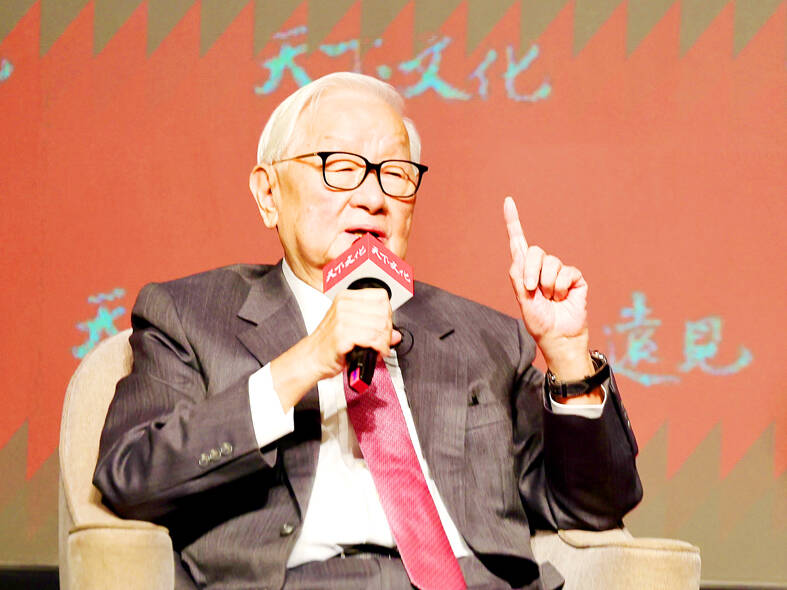Taiwan Semiconductor Manufacturing Co (TSMC, 台積電) founder Morris Chang (張忠謀) yesterday said that Intel Corp would find itself in the same predicament as it did four years ago if its board does not come up with a core business strategy.
Chang made the remarks in response to reporters’ questions about the ailing US chipmaker, once an archrival of TSMC, during a news conference in Taipei for the launch of the second volume of his autobiography.
Intel unexpectedly announced the immediate retirement of former chief executive officer Pat Gelsinger last week, ending his nearly four-year tenure and ending his attempts to revive the company’s past fortunes.

Photo: CNA
Intel hired Gelsinger when the US chip giant was looking for a new chief executive who could persuade the board with a strategy to save the chipmaker, Chang said.
Gelsinger’s eloquence made him Intel’s new leader at the time, he said.
Gelsinger’s strategy and ambition was to restart Intel’s old foundry business, so the company would design and make its own chips.
Intel now seems to be in the same difficult situation it was in four years ago with no chief executive and no strategy, Chang said.
It would be a formidable task for the US chipmaker to turn around its business if the board of directors do not put forward a strategy before picking a new chief executive, he said.
The problem would be less complicated if the company found a new chief executive to carry out the board’s strategy, he added.
Asked what was the main reason behind Gelsinger’s “forced” departure and Intel’s fall, Chang agreed with the idea that Intel missed opportunities and was left on the sidelines of the AI boom.
Gelsinger apparently preferred the foundry business over developing AI, although he also talked about Intel working on AI chips, Chang said.
Being a long-term customer and rival of TSMC, Chang said that Intel’s previous chief executives had been his friends, but not Gelsinger.
He seemed to be “hostile,” Chang said.
TSMC, the world’s biggest foundry service provider, outpaced and eventually overtook Intel to become the world leader in the most advanced technology when its 7-nanometer process technology entered volume production in 2018.
Asked why Nvidiia chief executive officer Jensen Huang (黃仁勳) became a candidate on TSMC’s shortlist to be a chief executive, Chang said Huang’s integrity, great vision and professionalism were the main reasons.
Huang turned down Chang’s offer because of his responsibility running the company he founded, Chang said.
Huang was only on the preliminary short list, he said.
Huang’s 7.5 percent stake in Nvidia could have been an obstacle for him taking the post, as TSMC would have asked him to sell the shareholding to avoid bias, Chang said, adding that he does not hold a major shareholding in any of TSMC’s customers.

TAKING STOCK: A Taiwanese cookware firm in Vietnam urged customers to assess inventory or place orders early so shipments can reach the US while tariffs are paused Taiwanese businesses in Vietnam are exploring alternatives after the White House imposed a 46 percent import duty on Vietnamese goods, following US President Donald Trump’s announcement of “reciprocal” tariffs on the US’ trading partners. Lo Shih-liang (羅世良), chairman of Brico Industry Co (裕茂工業), a Taiwanese company that manufactures cast iron cookware and stove components in Vietnam, said that more than 40 percent of his business was tied to the US market, describing the constant US policy shifts as an emotional roller coaster. “I work during the day and stay up all night watching the news. I’ve been following US news until 3am

UNCERTAINTY: Innolux activated a stringent supply chain management mechanism, as it did during the COVID-19 pandemic, to ensure optimal inventory levels for customers Flat-panel display makers AUO Corp (友達) and Innolux Corp (群創) yesterday said that about 12 to 20 percent of their display business is at risk of potential US tariffs and that they would relocate production or shipment destinations to mitigate the levies’ effects. US tariffs would have a direct impact of US$200 million on AUO’s revenue, company chairman Paul Peng (彭雙浪) told reporters on the sidelines of the Touch Taiwan trade show in Taipei yesterday. That would make up about 12 percent of the company’s overall revenue. To cope with the tariff uncertainty, AUO plans to allocate its production to manufacturing facilities in

COLLABORATION: Given Taiwan’s key position in global supply chains, the US firm is discussing strategies with local partners and clients to deal with global uncertainties Advanced Micro Devices Inc (AMD) yesterday said it is meeting with local ecosystem partners, including Taiwan Semiconductor Manufacturing Co (TSMC, 台積電), to discuss strategies, including long-term manufacturing, to navigate uncertainties such as US tariffs, as Taiwan occupies an important position in global supply chains. AMD chief executive officer Lisa Su (蘇姿丰) told reporters that Taiwan is an important part of the chip designer’s ecosystem and she is discussing with partners and customers in Taiwan to forge strong collaborations on different areas during this critical period. AMD has just become the first artificial-intelligence (AI) server chip customer of TSMC to utilize its advanced

Six years ago, LVMH’s billionaire CEO Bernard Arnault and US President Donald Trump cut the blue ribbon on a factory in rural Texas that would make designer handbags for Louis Vuitton, one of the world’s best-known luxury brands. However, since the high-profile opening, the factory has faced a host of problems limiting production, 11 former Louis Vuitton employees said. The site has consistently ranked among the worst-performing for Louis Vuitton globally, “significantly” underperforming other facilities, said three former Louis Vuitton workers and a senior industry source, who cited internal rankings shared with staff. The plant’s problems — which have not